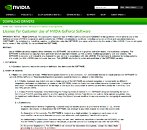Tuesday, December 26th 2017

NVIDIA Forbids GeForce Driver Deployment in Data Centers
NVIDIA recently updated the end-user license agreement (EULA) for their GeForce Software. There's one particular statement in the limitations section that caught our eye. And it reads: No Datacenter Deployment. The SOFTWARE is not licensed for datacenter deployment, except that blockchain processing in a datacenter is permitted. It seems that NVIDIA isn't too happy with data centers that utilize GeForce and TITAN graphics cards instead of the more expensive Quadro or Tesla cards. With this prohibition in place, data centers are forced to either invest in NVIDIA's pricier offerings or completely switch over to AMD. Data centers that are using GeForce products for cryptocoin mining are unaffected by this change in the EULA.Clearly, NVIDIA isn't wasting any time and has already started to enforce their new EULA. Sakura Internet, one of the largest data centers in Japan, was the first to receive a notice from NVIDIA to stop providing servers with TITAN X products.
Here's the Google-translated press release from Sakura:
Sakura's dedicated servers High-firing series Quad GPU new provision temporary suspension
December 21, 2017 Dear customers, Sakura Internet Inc. Thank you very much for your continued patronage of Sakura Internet.
On November 30, 2017, the licensing terms for the use of NVIDIA Corporation's driver software have been revised and the license terms for the latest GeForce driver software. The provision of "prohibition of introduction to the data center" has been added. For details, refer to Article 2.1.3 from the following URL.
In addition, we received written notice from NVIDIA Corporation. According to this notice, NVIDIA Corporation agrees to the above license terms on the GPU server service (Sakura's dedicated server high-fire series Quad GPU model) equipped with TITAN X provided by the Company, Based on the view that downloading the driver software for GeForce on the server is an infringement of copyright (reproduction right). We urge customers who have downloaded it on or after December 7, 2017 to stop offering the Quad GPU model.
We are currently considering NVIDIA Corporation's notice content with experts as well, but considering the possibility of inconvenience to our customers, we are considering the following "Sakura's dedicated server. We will temporarily suspend the new provision of the high-fire series Quad GPU model ".
We are sorry to cause inconvenience, but we will do our utmost to make it possible for our customers to use our services with confidence. We sincerely appreciate your continued patronage.
Sources:
NVIDIA, Sakura Internet
Here's the Google-translated press release from Sakura:
Sakura's dedicated servers High-firing series Quad GPU new provision temporary suspension
December 21, 2017 Dear customers, Sakura Internet Inc. Thank you very much for your continued patronage of Sakura Internet.
On November 30, 2017, the licensing terms for the use of NVIDIA Corporation's driver software have been revised and the license terms for the latest GeForce driver software. The provision of "prohibition of introduction to the data center" has been added. For details, refer to Article 2.1.3 from the following URL.
- Japanese:
- English:
In addition, we received written notice from NVIDIA Corporation. According to this notice, NVIDIA Corporation agrees to the above license terms on the GPU server service (Sakura's dedicated server high-fire series Quad GPU model) equipped with TITAN X provided by the Company, Based on the view that downloading the driver software for GeForce on the server is an infringement of copyright (reproduction right). We urge customers who have downloaded it on or after December 7, 2017 to stop offering the Quad GPU model.
We are currently considering NVIDIA Corporation's notice content with experts as well, but considering the possibility of inconvenience to our customers, we are considering the following "Sakura's dedicated server. We will temporarily suspend the new provision of the high-fire series Quad GPU model ".
- Quad GPU (Pascal) model: TITAN X (Pascal architecture) installed
- Quad GPU (Maxwell) model: TITAN X (Maxwell architecture) installed
We are sorry to cause inconvenience, but we will do our utmost to make it possible for our customers to use our services with confidence. We sincerely appreciate your continued patronage.


90 Comments on NVIDIA Forbids GeForce Driver Deployment in Data Centers
Think of the children!!!!!1
And you're wrong in the general statement that I've underlined. Manufacturers don't tell you what you can do. They tell you what you can't do - and they are allowed to do that - based on copyright.Wrong again. Copyright is the fundamental ownership right. It is above the rights that the buyer/user has. Otherwise it wouldn't make any sense.Licensing is both enforceable and lawful. It has been for decades.
I just don't get how you missed that. What have you been doing for the last 30 years? :-P
Enforcability is actually a really good question. I have a feeling that Nvidia has no plans to take this to court because that would just take too long. Cloud service provider likely has other contracts with Nvidia that will be used as leverage. Btw, Titans are almost exclusively sold by Nvidia themselves and warranty terms also state that datacenter usage voids warranty.
It could well be that a lawsuit will stop them doing this. After all, datacentre operators have got money behind them unlike the average Joe like us and can fight back against such malpractice.
They are not excluding cryptomining because AMD is more competitive there. They are excluding it because there is money in it for them unlike using Geforces for GPGPU/HPC applications.
Lawsuit, which is not likely to happen or I would say is not likely to be won by datacenter operators, would probably result in no more fully functional Titans rather than any other outcome. The reason datacenter operators have got money behind them is that they make money off the service that at least in part relies on the hardware in question. That makes it contractually and legally different from consumer use of cards.
These kinds of business practices along with the hostility against the open source community is the very reason why I'm tolerating my 390.
A genuine example of product segmentation is between a GeForce card and it's Quadro or Tesla equivalent. Those professional cards will have near enough the same processing power in games, but have other hardware and software differences, such as more reliable hardware (eg ECC memory) cherry picked GPUs and general board design and greater effort spent on debugging and validation of the hardware and drivers as well as better customer support from NVIDIA. That's where all that extra money goes - as well as a reassuringly expensive markup, of course. ;)
And yes, it's exactly because they know AMD is competitive in crypto. What do you think would happen if they excluded that too? All data centres using their cards for crypto would go AMD. Duh!
Yes, there are those legal differences, but I don't think they trump what I've said above.One does wonder how much influence Microsoft has in fostering such "hostilities" in the background. I'm thinking about their anti-Linux propaganda about a decade ago regarding "naked PCs" etc.
Hardware differences - Perhaps minor but check
Software differences - Check
More reliable hardware, board design etc - Check.
Greater effort on debugging validation etc - Check
Drivers and support - Check
Reassuringly expensive markup - Definitely check
What makes it not a genuine segmentation?Why would they want to exclude cryptomining? What would be the reasoning behind it? They do not have crypto-specific hardware that they would rather want to sell. Or maybe they do but crypto-specific cards have so far been cheaper than standard Geforces and they probably do not mind all that much about someone buying more expensive stuff. AMD being more competitive is more of an afterthought here.
I don't know why you're still arguing about the cryptomining.
But that is exactly the product segmentation that we are talking about. What makes this an obvious money grab then as opposed to normal product segmentation?While you claim it is all about AMD, there are pretty clear and simple business reasons for excluding cryptomining other than anything to do with AMD.
Then again, not many would want to go against Nvidia, they have big coffers and the court process would last years and years, as is usual in these kinds of situations...
Either way, not a big fan of this. Seems the Titan series keeps losing points over and over again...
If you don't want to use the original drivers, you have 2 choices:
1) use your GPU as a paperweight, bookholder or something similar,
2) use non-manufacturer drivers.
Going with (2) you're losing manufacturer's support and warranty - a no-go for commercial datacenters.
Looking at this problem from a more customer-ish perspective, most people aren't really buying much software. They are buying computers. A computer usually includes something called Windows and something called MS Office. So, in your opinion, is this customer buying just hardware or also software?
And on the other hand, there is some software built-in the PC electronics (BIOS and other low-level stuff). These can be copyright-protected as well.
Do you own a car? Cars have huge amounts of software - not just drivers etc, but also the OS that operates the interfaces. Via the console (radio, navigation and stuff) you should be able to find the license information. So you bought a vehicle, but some software copyright is still in force.
And it has 58k followers! Are these all AMD GPU owners or what? :roll:
EDIT:
I've watched his video about global warming (not a very good one, but whatever) and then checked THE COMMENTS!
It seems at least some of the 58k people follow him purely for entertainment. :-D
Both companies make great products. End of story. NVidia products do some tasks marginally better than AMD's offerings and AMD's products do marginally better at other tasks. The details that define what you should buy is your budget, what you want to do and how long you need to do it. The smart buyer does their homework(research) and buys what fits their needs. Moron's play the brand loyalty card.
EDIT; Should clarify. There nothing wrong with brand loyalty, per-se. But when it gets in the way of sound judgment, logic and factual reasoning, that's when it becomes moronic.